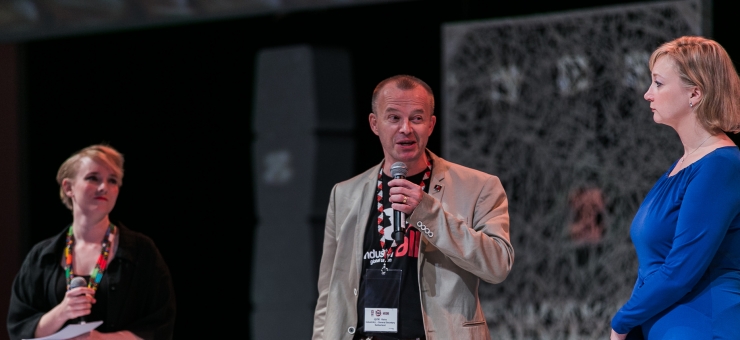"A union response unlike anything before" - Tansy Hoskins on the Bangladesh Accord

When we talk about Rana Plaza we talk about the 1,138 people, mostly young women, that were killed. But when you go to Savar just outside of Dhaka and sit and talk with survivors, or the families of the deceased, you begin to understand that this is a tragedy that has impacted on hundreds of thousands of people. The networks of families left behind, the children psychologically scarred and unable to let their fathers out of their sight, the myriad of villages that lost young women and the mothers that wait in the remains of the collapse clutching tattered photos of children that were never found.
The added pain of this disaster was that it was not unexpected. Global labour had been warning that a catastrophe of this magnitude was possible, that the Bangladeshi garment industry was at breaking point. These were warnings that big business ignored, too intent on reaping profits from the Global South. The warnings even went unheeded after fire swept through the Tazreen factory in 2012 and killed over 100 women.
In the hours and days after Rana Plaza collapsed, I can only imagine that it must have been anger at being ignored as well as the sickening pain of being right that compounded Union determination for a global response the like of which we have not seen before. How else do you step up to the most powerful people in the world and tell them: this time, you sign our deal.
But of course anger and the burning desire to do the right thing do not change the world. Three weeks after the collapse there were no brand signatories, just two who had said ‘maybe’. Even over the bodies of 1,138 people many brands were unmoved.
I first heard the inside story of what happened next at the British Trade Union Congress in September 2013. Listening to Philip Jennings speak at the Congress, the excitement and daring of what had been achieved became apparent.
He outlined how it was at this point that a combination of organised labour and grass roots activism asserted itself. Using the outpouring of anger at the tragedy, a campaign of media – and social media – pressure was launched against H&M in Sweden. As public pressure mounted H&M came to the table pen in hand.
The most crucial power base was however the affiliated unions. As Phillip Jennings explained to the TUC: “We said to our union affiliates in the retail sector, ‘Pick up the phone. Every one of you has a collective agreement, some of you are sitting on boards of directors — you get the companies to sign up.’”
The stories of trade unionists demanding that big retailers like Marks & Spencer and Next sign the Accord to protect their brothers and sisters along the garment supply chain, remain moving to this day. “Our members are the ones that sell these clothes,” Fiona Wilson, USDAW’s head of research and economics, told me later. “They are linked with workers in Bangladesh; they care about what happens to these people and their families.”
The pressure campaign by the affiliates was a success. Within days 35 retailers signed a legally binding, worker led agreement that stated in black and white that they now had responsibility for the workers in their factories.
Today, the Bangladesh Accord contains the signatures of some of the most powerful brands in the world. The first round of inspections has been completed, eighteen highly unsafe buildings have been closed and many more given strict standards to adhere to. There are three more years of hard work left to do and more campaigning to ensure a decent compensation agreement for families of victims and survivors.
It will remain unforgiveable that 1,138 people had to die before big business would take some responsibility for its supply chains. I do believe, however, that in the history not just of the fashion industry, but also of the global labour market and indeed of the world, that the Bangladesh Accord will be judged as a momentous achievement and a testimony to international solidarity amongst organised working people.
It was therefore an honour to come and speak with the UNI affiliates in Cape Town – to meet many of the people who stood up to be counted and ensured that we are not gathered here to mourn yet another building collapse, but rather to mark a historic achievement and pledge to keep fighting until the garment industry is made fully fair and safe for its millions of employees.

